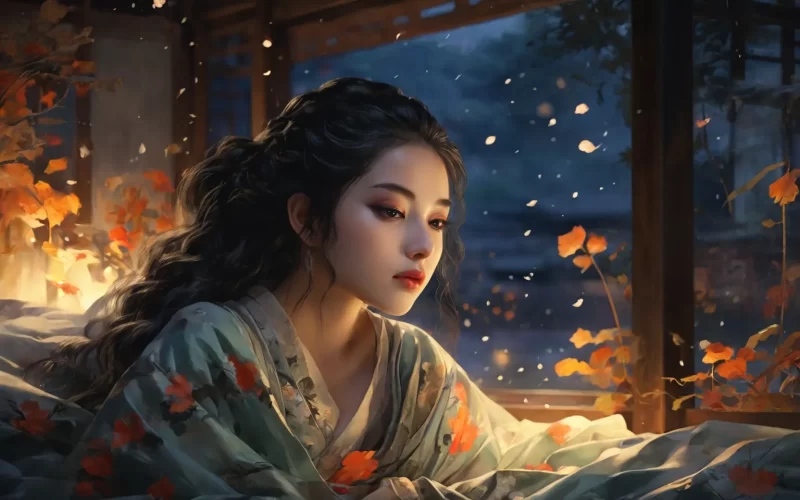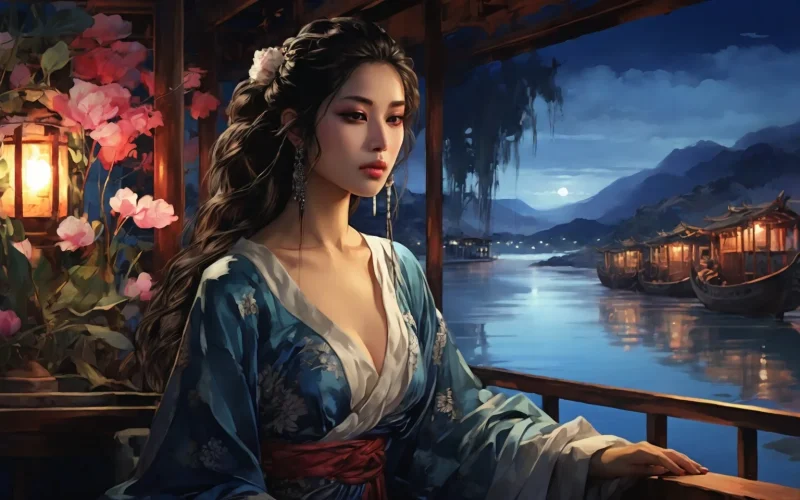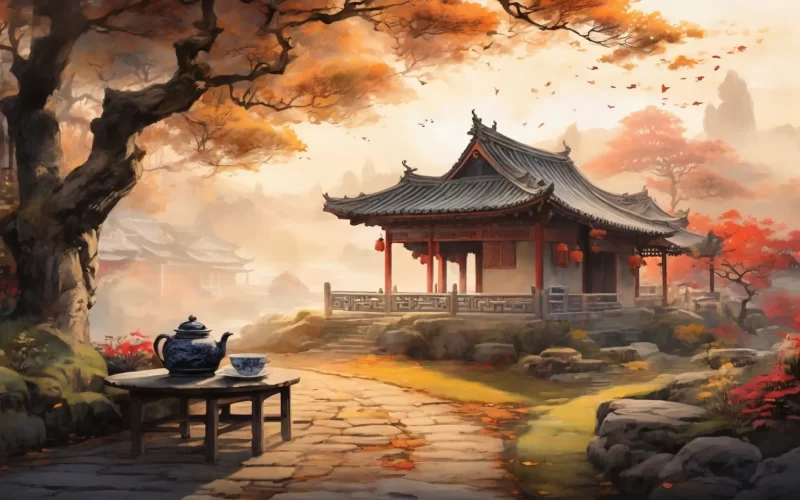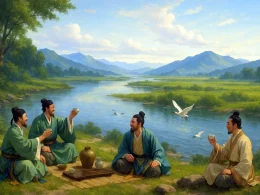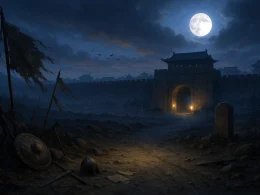A girl of the Lu Clan who lives in Golden-Wood Hall,
Where swallows perch in pairs on beams of tortoise shell,
Hears the washing-mallets’ cold beat shake the leaves down.
The Liaoyang expedition will be gone ten years,
And messages are lost in the White Wolf River.
Here in the City of the Red Phoenix autumn nights are long,
Where one who is heart-sick to see beyond seeing,
Sees only moonlight on the yellow-silk wave of her loom.
Original Poem
「独不见」
沈佺期
卢家少妇郁金堂,海燕双栖玳瑁梁。
九月寒砧催木叶,十年征戍忆辽阳。
白狼河北音书断,丹凤城南秋夜长。
谁为含愁独不见,更教明月照流黄。
Interpretation
Composed during the formative Kaiyuan era before the High Tang's golden age, this poem emerges from a transitional period of domestic stabilization amidst ongoing frontier conflicts. As one of the "Four Talents of Early Tang," Shen Quanqi pioneered regulated verse (律诗) forms, here masterfully adapting the ancient "Alone and Unseen" yuefu theme into a seven-character regulated verse. The work portrays a young noblewoman's anguish during her husband's prolonged border service, blending social realism with psychological depth through meticulous parallelism and tonal precision.
First Couplet: "卢家少妇郁金堂,海燕双栖玳瑁梁。"
Lú jiā shàofù yùjīn táng, hǎi yàn shuāng qī dàimào liáng.
In the Lu mansion's turmeric-scented hall, Sea swallows nest paired on tortoiseshell beams tall.
The luxurious imagery ("turmeric-scented," "tortoiseshell") establishes aristocratic privilege that ironically intensifies the heroine's isolation. The paired swallows (海燕双栖) serve as cruel foils to her solitude, their marital harmony mocking her separation. This ornamental setting reflects Early Tang's courtly aesthetic while foreshadowing emotional desolation.
Second Couplet: "九月寒砧催木叶,十年征戍忆辽阳。"
Jiǔ yuè hán zhēn cuī mù yè, shí nián zhēng shù yì Liáoyáng.
September's pounding mallets hasten leaves' fall, Ten years he's guarded Liaoyang—ten years' thrall.
Autumn's "pounding mallets" (寒砧), traditional soundmarks of lonely wives preparing winter clothes, become temporal metronomes counting her abandoned youth. The decade-long separation (十年征戍) exposes the human cost of Tang expansionism, with Liaoyang's frontier embodying the empire's insatiable militarism.
Third Couplet: "白狼河北音书断,丹凤城南秋夜长。"
Báiláng hé běi yīnshū duàn, Dānfèng chéng nán qiū yè cháng.
North of White Wolf River, letters ceased, South of Phoenix City, nights increased.
The geopolitical dichotomy (河北/城南) maps her psychological landscape: the severed frontier correspondence (音书断) versus the interminable southern nights (夜长). Danfeng City's "Phoenix" symbolism contrasts with her earthbound suffering, while "White Wolf River" evokes both the distant battleground and primal loneliness.
Fourth Couplet: "谁为含愁独不见,更教明月照流黄。"
Shéi wèi hán chóu dú bú jiàn, gèng jiào míngyuè zhào liúhuáng.
Who doomed me to grieve unseen, alone? Now the bright moon mocks my bed's yellow tone.
The rhetorical cry (谁为) transforms lament into accusation, challenging the cosmic order itself. The "bright moon" (明月), classical symbol of shared longing, becomes a cruel spectator illuminating her "yellow bed curtains" (流黄)—a chromatic symbol of forsaken matrimony from Han dynasty lore. This final image crystallizes regulated verse's power to compress cultural memory into devastating emotional shorthand.
Holistic Appreciation
This is a quintessential palace lament poem, reinventing the old Han Music Bureau title "Alone, Unseen" with fresh meaning. With delicate and graceful strokes, the poet depicts a young noblewoman in opulent chambers, enduring autumn nights alone, yearning for her husband long stationed in Liaoyang. The opening uses lavish interiors and paired seabirds to establish her social status and psychological contrast. The middle section shifts to seasonal imagery—"cold laundry mallets" and "fallen leaves"—hinting at inner desolation and passing time, while concretizing her suffering through details of her husband's distant service and absent letters. The final couplet erupts in direct soliloquy, laying bare her unconsoled anguish, with even the "bright moon" becoming an object of her resentment.
The poem's language is elegantly refined, its imagery classical and profound, its structure meticulous, and its emotion nuanced. Shen Quanqi skillfully merges ancient Music Bureau themes with regulated verse form, achieving both formal precision and lyrical depth—a representative work of the maturing lüshi tradition.
Artistic Merits
The poem features polished, fluid language and tightly woven structure, excelling at using environment to reflect inner states. The poet adeptly blends old Music Bureau motifs with regulated verse, employing paired seabirds, autumn sounds, and southern city nights to amplify the protagonist's solitude and longing, seamlessly fusing scene and emotion. By transitioning from objective description to subjective outcry, the poem naturally progresses from narration to lyricism, its restrained yet profound feeling showcasing Shen Quanqi's mastery and innovation in seven-character regulated verse.
Insights
Through the image of a woman waiting alone, the poem reveals the emotional toll of war on ordinary lives and mirrors the isolation of women in feudal society. The poet's empathetic, elegant portrayal ensures the work's beauty of form coexists with thematic depth. Today, it still resonates as a meditation on separation, loneliness, and war's cruelty—a timeless reminder to cherish peace and reunion.
Poem translator
Kiang Kanghu
About the Poet:
Shen Quanqi (沈佺期, c. 656 - c. 715), a native of Neihuang County in Henan Province, was a renowned Tang dynasty poet. Along with Song Zhiwen, he was collectively known as "Shen-Song" (沈宋), recognized as pivotal figures in standardizing the regulated verse (律诗) form. Celebrated for his rigorous adherence to poetic rules and metrics, Shen exerted profound influence on the development of "modern-style poetry" (近体诗).





